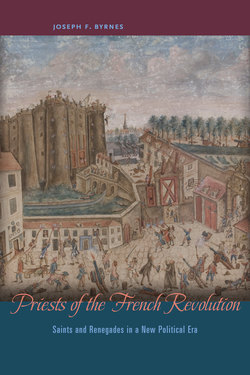Читать книгу Priests of the French Revolution - Joseph F. Byrnes - Страница 9
На сайте Литреса книга снята с продажи.
ОглавлениеAcknowledgments
In my prologue I praise—and none too much, I might say—the colleagues and friends whose books have provided the bases and parameters essential for the structuring of my own research. To add thanks to praise, I want to express my gratitude to Rodney J. Dean, who carefully read through earlier versions of my book; Timothy Tackett, who instantly responded to all my questions about his own extensive research sans pareil; and Paul Chopelin, whose support, encouragement, and generous welcome to his own remarkable private library facilitated my manuscript revisions these past few years. Paul and his wife, Caroline Chopelin-Blanc, also a leading scholar of the Revolution, graciously received me into their home, where I made new contacts, Michel Biard in particular; renewed old contacts, Daniel Moulinet in particular; and met members of the Université de Lyon III group RESEA (Religions, sociétés et acculturation). Bernard Hours, director of RESEA when I arrived, assuming thereafter the headship of the more extended LARHRA (Laboratoire de recherche historique Rhône-Alpes), arranged my situation as a guest associate of RESEA and LARHRA with generosity and great good humor. Thanks to the Chopelins, Bernard Hours, Yves Krumenacker, and Christine Chadier, we were able to arrange for a colloquium on the constitutional bishops, the springboard for our continuing work on both bishops and priests of the Revolution. It is not possible to name all the participants here, but I do wish to note the patronage of the virtual dean of church–state studies of the revolutionary era, Bernard Plongeron, whose unparalleled erudition I was finally able to encounter face to face; the assistance of Jacques-Olivier Boudon, the Sorbonne scholar who years ago encouraged the pursuit of any useful prosopography of the clergy of the era; and the expertise of Philippe Bourdin, cordial érudit of the Université Blaise Pascal. It was also the occasion to integrate into a wider framework the accomplishments of our original research group for the study of the constitutional bishops, Rodney Dean, Jean Dubray, Emmanuel Lecam, Michel Deblock, Valérie Murger, and Guillaume Colot. Both Valérie Murger and Fabien Vandermarcq of the Bibliothèque de Port-Royal were the principal insurers of my successful work at that veritable shrine of Constitutional Church sources.
I have had several extended conversations with Jacques Guilhaumou, to whom I am especially indebted for interpretation of the complexities of the early career of the abbé Sieyès and for delivering me from the redoubtable task of transcribing all of Sieyès’s Sur Dieu ultramètre, the centerpiece of my study of Sieyès in chapter 1. Alyssa Sepinwall graciously supplied guidance at every turn on the career of the abbé Grégoire—along with encouragement and the example of a scholar at the service of the field of history and the fellow scholars who work there.
This is not my first experience publishing with Penn State University Press: in fact, brief portions of chapters 5, 7, and 11 derive from chapter 1 of my Catholic and French Forever (Penn State, 2005). I continue to be amazed, however, at the intelligence, dedication, and cordiality of the whole équipe, beginning with Kendra Boileau, omnicompetent and a lover of French history and literature, who has been at once my history editor, editor-in-chief, and ever-encouraging adviser. Whatever faults this book may have are certainly, then, mine alone.
At Oklahoma State University, my essential aid in working up the présentation of my work has been the master of illustration and digitizing, David Thompson of the OSU Library. From my early attempts to get the relevant illustrations from the Bibliothèque nationale into my first manuscript through the digitizing of the final version for the Penn State Press, David has furnished expertise, lots and lots of time, and unfailing good humor. And Michael Larson of the Geography Department refined for my needs the maps that I have used in this book. The History Department has provided funds for research on several my chapters, and the supervising secretaries, Susan Oliver and Diana Fry, have handled all the logistics of manuscript production carefully, rapidly, and with salt-of-the-earth kindness; furthermore, colleagues have been uniformly supportive of the book. Overall, I want to highlight in particular the support of my dear friend Tonia Sharlach.
Across the many years, my daughter Veronica Byrnes and my son Michael Byrnes have been at the center of my real life, as much in Boston and Chicago as at home. I have here neither adequate words nor sufficient space to express my love and appreciation. To them I dedicate this book.
